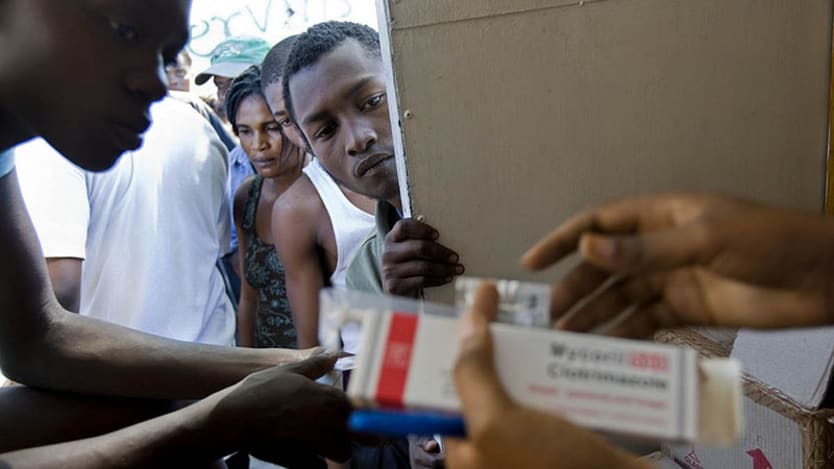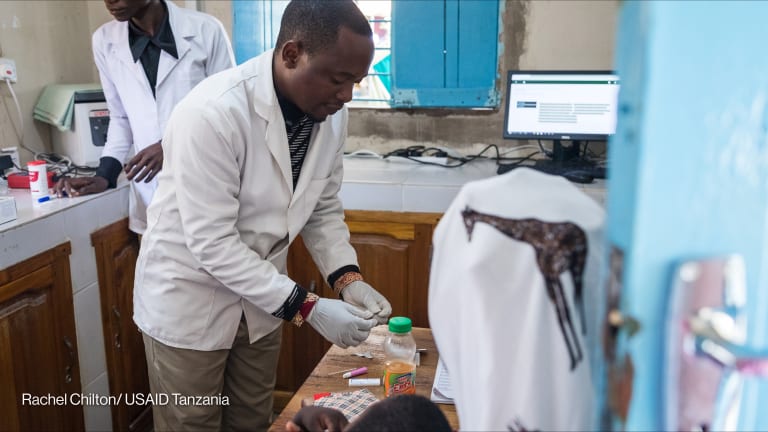
An estimated 2 billion people lack access to essential medicines, most of them living in Asia and Africa, according to the World Health Organization. While progress has been made in the past three decades, thanks in part to a renewed focus placed on diseases such as HIV and AIDS, malaria and polio, much remains to be done to ensure access to treatment for all.
This is a complex issue that has no simple answer. Health systems and health infrastructure, supply of medicines, logistics and pricing of products each play a crucial role in facilitating or inhibiting access to medicines. Governments, intergovernmental organizations, development organizations and pharmaceutical companies therefore have no choice but to work together to achieve results.
For the pharmaceutical industry, improving access to medicine isn’t just a matter of reaching their corporate social responsibility goals anymore. The growing economies of middle-income countries such as China and Brazil have generated new markets and business opportunities that are difficult to ignore. According to Bernstein & Co. Analysts, 32 percent of Sanofi’s revenue now comes from so-called emerging markets, (26 percent for Novartis) with strong sales growth in vaccines.
Intellectual property
Pharmaceutical companies are now beginning to see least-developed and low-income countries as new frontier markets, but with many of them clinging to their intellectual property rights, the production and delivery of generic drugs in the world’s poorest areas has been making slow progress. While LDCs benefit from an exemption to the World Trade Organization’s Trade-Related Aspects of Intellectual Property Rights agreement to apply and enforce patents, lower-middle-income countries are facing huge barriers tied to intellectual property.
Some pharmaceutical companies, however, are turning to licensing as an alternative to enforcing intellectual property rights. GlaxoSmithKline PLC recently announced it would grant licenses to generic manufacturers in 35 lower-middle-income countries. Gilead is also licensing some of its portfolio, including HIV/AIDS and hepatitis C, to generic manufacturers.
“They’re finding more interesting ways of ensuring licensing of their products,” Jayasree K. Iyer, executive director of the Access to Medicine Foundation told Devex. “They do see the opportunity with licenses to get to know the climate in these countries where they may not have many years of experience behind them.”
The United Nations-backed Medicine Patent Pool has been considered as a huge achievement in making patent-protected products available to the world’s poor. It aims at reducing the price of treatments for HIV, tuberculosis and hepatitis C through voluntary licensing and patent pooling. Since its creation in 2010, the MPP has signed agreements with a number of companies including Bristol Myers-Squibb, Gilead and Merck.
Affordability
Pricing of medicines and vaccines plays a key role in enabling access to pharmaceutical products. Created in 2000, Gavi, the Vaccine Alliance, has been able to negotiate lower prices with pharmaceutical companies by pooling the demand for vaccine from countries in need. Since then, several companies have adopted innovative pricing mechanisms to address the diversity of the markets they serve. Companies such as GSK, Gilead and Bayer have adopted flexible or tiered pricing schemes.
“They’re starting to look at these markets and cater to the wide variety of patients that live there, but that covers multiple socioeconomic statuses and multiple tiers,” said Iyer.
But as an increasing number of countries transition to a middle-income status, they must prepare to take on the financial and logistical burden of procuring products without the support of the development sector and the benefit of lower-tier pricing. Seventy-three percent of the world’s poor live in middle-income countries, and at least one-third of the global population has no regular access to medicines, according to the WHO.
Aurelia Nguyen, director of policy and market shaping at Gavi, said there is a growing need to support these countries during their economic transition.
“It involves having a progressive enough approach, and having manufacturers be supportive in the way they supply to countries over the medium and long term,” she explained.
Progress on achieving universal health coverage can lead to unexpected outcomes. Douglas Keene, vice president of the pharmaceutical management and health technologies group at Management Sciences for Health, said that certain countries have experienced a two- or threefold increase in their costs as they try to implement national insurance programs, as demand increases for medicines.
“We want to help countries set up the right systems and structures in a way that won't cause disruption to the overall program or slow their progress,” he explained.
Changing needs
Neglected tropical diseases remain a considerable challenge in developing countries, with 1 billion people suffering from conditions that have historically been of little interest to the pharmaceutical industry, such as dengue fever, leprosy, Chagas’ disease or guinea worm. Renewed attention was brought to the issue in 2012 with the signing of the London Declaration on NTDs.
Its goal of controlling or eliminating 10 NTDs by 2020 has been endorsed by a number of pharmaceutical companies, governments, the World Bank and global health organizations. But although progress has been made and millions of people have benefited from donated medicine, more needs to be done so that countries can stay on track to reach the 2020 milestone.
Some pharmaceutical companies have responded with new approaches to R&D, licensing and marketing. Eisai has been proactive in entering into partnerships with various multi-stakeholder organizations to help develop treatments for eumycetoma (with DNDi, the Médecins Sans Frontières-founded Drugs for Neglected Diseases initiative) and lymphatic filariasis (with WHO and the Global Network for Neglected Tropical Diseases). And Sanofi has prioritized developing countries for the registration of its vaccine for dengue fever.
But a new challenge is arising with the growing threat of non-communicable diseases, which creates new needs in terms of procuring and delivering pharmaceutical products. Cardiovascular diseases, diabetes and cancer are among the conditions that are increasingly affecting low- and middle-income countries. According to the WHO, cancer now kills more than 5.3 million people in developing countries each year — more than HIV/AIDS, tuberculosis and malaria combined.
Earlier this year, GSK announced that it would submit patents on future cancer drugs to the MPP, suggesting the patent pool will now add oncology to the range of diseases it covers. Novartis is also among companies that have targeted noncommunicable diseases; it has offered 15 generic or patented medicines for NCDs to governments and NGOs at a lower cost.
“We're trying to see the beginning of a lot of these pilots that I think in a few years we'll know which one works and which one is better,” said the Access to Medicine Foundation’s Iyer. But dealing with NCDs, she warned, is in large part a matter of strengthening health systems. “There’s a lot that needs to be done, which makes it a development issue.”
Reaching the last mile
Procurement and delivery play a substantial role in the equation that leads to better access to medicines. Stockouts, lack of trained staff at health care facilities, lack of access to insurance schemes and remoteness of serviced areas are just some of the challenges that prevent pharmaceutical products from reaching each step of the supply chain.
Gavi estimates that up to 90 percent of the health facilities it supplies are using substandard equipment, thereby threatening cold chain integrity. In response, the organization has launched the Cold Chain Equipment Optimization Platform to help facilities renew their equipment. New equipment using passive technology is also being introduced to off-grid areas.
With most patients living in rural areas, traditional health care centers may not always be the best points of access to medicine. In Tanzania, MSH has partnered with the government to build the capacity of existing drug sellers, who are often untrained and sometimes sell prescription drugs illegally. The newly accredited drug dispensing outlets enable patients to buy antimicrobials from trained staff and in a standardized environment. The model has been scaled to the whole country, and is now being replicated in Uganda and Liberia.
“[Drug sellers] become part of the solution and part of the health care system, as opposed to people who are selling drugs illegally,” said MSH’s Keene.
MSH has also established the Supply Chain Management System to deliver HIV/AIDS treatment and supplies as part of the U.S. PEPFAR initiative, reaching remote areas around the globe. SCMS boasts of keeping its rate of lost products to 0.02 percent, and its expiry rate at 0.5 percent, thus exceeding the standards of the pharmaceutical industry.
Yet reaching the “last mile” remains a problem in cities as well. A report from MSF points to serious stockouts in antiretroviral therapy products. In Kinshasa, for instance, 77 percent of health centers surveyed reported stockouts of at least one ARV over three months. Now more than ever, improving supply chains constitutes a crucial step to improving access to medicine.
Partnerships, partnerships, partnerships
Cross-sector collaborations have yielded some of the most effective solutions to improve access to medicines, spurring innovation and improving health systems.
Iyer, of the Access to Medicine Foundation, points to product development partnerships as structures that bring a wide range of actors together. PDPs help reduce the risk taken by pharmaceutical companies in developing new products, improve product delivery, and create better pricing mechanisms. The Medicines for Malaria Venture and the DNDi are examples of PDPs. The Pediatric Praziquantel Consortium to Treat Schistosomiasis in Young Children also shows how pharma companies can team up with academia to address neglected diseases.
Other types of incentives are also being explored. As part of its collaboration with GSK and Pfizer to develop a pneumococcal vaccine, Gavi created an “advance market commitment” guaranteeing the procurement of the vaccine, should its development come to fruition.
“This enables us to share the costs and risks associated with R&D, and enables us to make sure that we're not duplicating our resources,” said Jon Pender, vice president for intellectual property and access and global health at GSK, of cross-sector partnerships. “It also provides a network of stakeholders and partners that we can work with to try and ensure that the results of those partnerships in terms of new products being developed can reach the people they need as well.”
New types of partnerships are yet to be devised. Gavi recently made headlines for having teamed up with delivery giant UPS and robotics company Zipline to pilot a project in Rwanda to deliver vaccines using drones. One thing’s for certain: in the future, new technology and innovative business models will play a core role in delivering much-needed medicine to the world’s poor.
How can the R&D of medicines and vaccines be improved to benefit the world’s poor? Have your say by leaving a comment below.
Access to Medicines is an online conversation to explore work being done to guarantee access to lifesaving medicines, where solutions are still needed. Over three weeks Devex, along with our partner Management Sciences for Health, will analyze and amplify the discussion on global access to medicines and examine the future of medicine access for individuals at the last mile, in a way that saves lives, empowers communities and builds resilient health systems. Join us as we look towards the future, tagging #access2meds and @Devex to share your thoughts.








